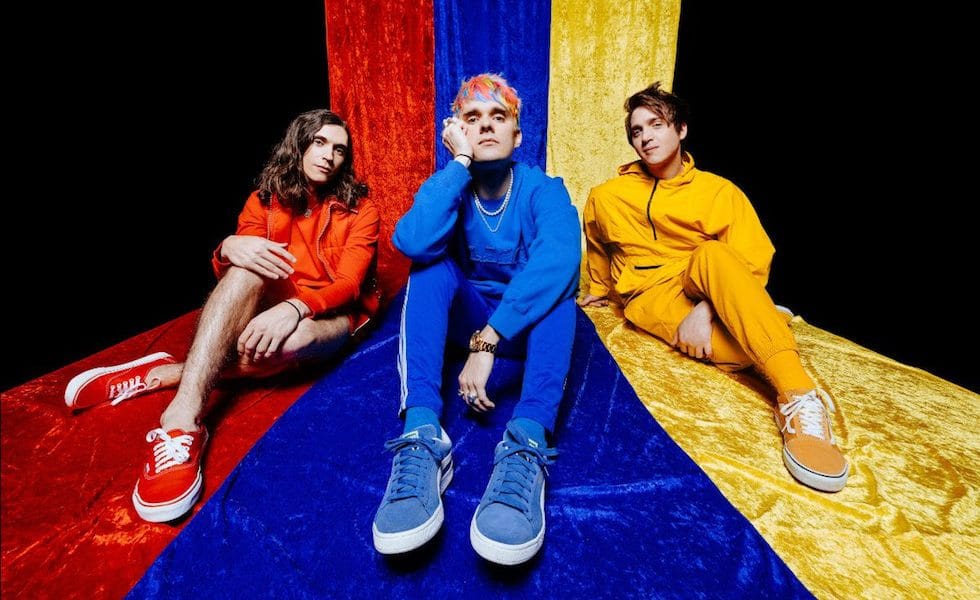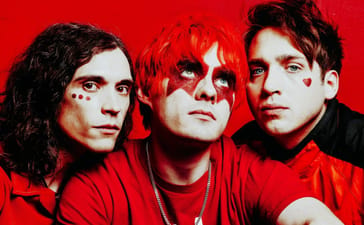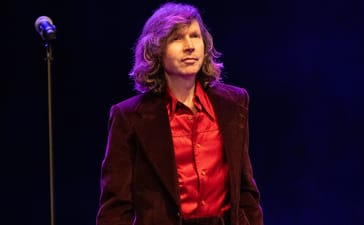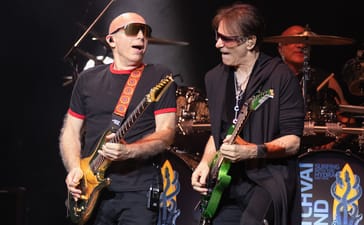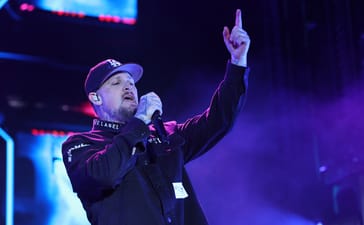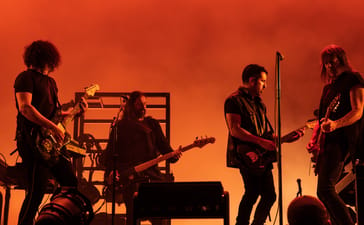It’s clear that a lot went down in the world of Waterparks since their last outing on 2019’s FANDOM. Having said that, from the outside looking in, you could be forgiven for clocking the trio as the same endearing goofballs we’ve come to know and love since their 2016 debut.
That’s because the changes aren’t on the surface. Instead, you can find them deep within the mix of their new record Greatest Hits – in the lyrics, the production, and the album’s natural ebb and flow. At times, the throughline of Greatest Hits is gentle, at others, abrupt, poked and prodded to fit the vision of its makers.
As Blunt Magazine would learn speaking with vocalist Awsten Knight, Greatest Hits was always meant to be more than just a traditional release, even on top of flipping the script on its title and, instead of collating Waterparks’ best and brightest cuts, creating an entirely new studio album.
“It’s not that I necessarily went into it with the intention of like, ‘I’m going to make this difficult,'” he explains. Maybe not difficult, but challenging all the same; intricate and vivid. After all, Knight elaborates that he finds himself resonating the most with albums that don’t simply hand-feed the listener, but instead provide a rough map of side missions, winding roads and sweeping valleys.
“It creates more of a world people can immerse themselves in. I feel like singles, you’re just showing people, ‘Here’s a highlight. Here’s a highlight. Bye. Get out.’ I wanted this to be something that you’d really go in on, sink into, and stay for a while. That’s not to say there’s not fucking bangers, because there totally are. But there are so many aspects of this album that give people more of a world to look into and think about.”
Greatest Hits is littered with standout moments, but none demonstrate Knight’s point quite like ‘Gladiator’, located towards the album’s close. A spoken word interlude track that’s leagues away from anything that Waterparks have put on wax before, the track features the tough-love advice of Josh Madden, a member of Waterpark’s management team, bestowing some hardcore motivational wisdom. “He was giving me this talk about celebrity culture and how people view musicians and how it traces back and where it relates and falls in line in different periods of history and different cultures and all this shit,” Knight recalls.
But far from some random tangent, ‘Gladiator’ is indeed indicative of Knight’s newfound penchant for deeper world-building.
“Where it sits in the album, it’s the connecting piece between ‘Like It’, then it’s that, the turning point, and then ‘Magnetic’. ‘Like It’ is all the external stressors and all these industry things, like label stuff, fans, whatever. Then there’s the ‘Gladiator’ interlude. Then ‘Magnetic’ is the internal, it’s all about me. You know what I mean? ‘Gladiator’ is the turning point in the album.”
Knight’s thirst for deeper meaning transcends his art, as it becomes clear that an extended period of isolation had him pondering aspects of the music industry that he and his bandmates had somewhat effortlessly risen to the highest echelons of. Having kept busy through the recent dark times, Knight takes issue with simply returning to the way things once were pre-lock down, that is, once again placing our trust back into the many traditional systems which inevitably failed us at some stage over the past 18 months. “We’re not in traditional times. Why would that work?” Knight posits. “Dude, the Anti-Show [live stream] that we did, and not to be weird about it, but dude, I’m pretty sure that did better than any tour we’ve ever done.”
“I’m saying people-wise, the amount that were in there watching, and as far as merch sold, as far as tickets sold, as far as profits and shit. Because you didn’t have to pay for a bus. You don’t have to pay for a billion fucking people. You don’t have to pay for travel, all this shit. We just showed up and did it, and then went home afterwards.
“I’m going to tell you this right now. Touring is fucking very expensive. It’s insanely expensive. You have to pay for a bus, which is shockingly up there. You have to pay for all your production. You have to pay for a full crew, which is like nine, ten people. Obviously flights, you have to pay for every flight. There’s insurance. There’s so much, dude.”
Knight echos a sentiment shared by many of his peers who dabbled in the digital realm throughout this time. While live streams will never totally replace the energy and necessity of a live performance, much like the handshake, or the face-to-face meeting, they are an appealing alternative, one that Knight firmly believes isn’t going away. “Now that there’s been a digital component added into the mix, as far as shows go, that’s not going anywhere.”
“I was fucking in bed at the end of the day and I was just like, ‘Oh my god, this is amazing, and I’m not out here for four months getting sick.’ People are excited to go play live shows again, but everybody kind of got a taste of that. I was able to make it a cooler show, because it’s just one, and we don’t have to lug the stuff everywhere.
“I was like, ‘I like this production better, and I get to fucking go home. I just definitely think, as far as what’s changing, there is going to be a lot more of that digital show stuff implemented, even when things go back to normal, because some people don’t even want to fucking leave their house. I feel like for shut-ins, people that are just like home bodies, they enjoy being on the couch. There’s a new market now.”


